| Editorial |
| Bridging evidence and clinical practice: a practical guide for enteral nutrition from the Korean Society for Parenteral and Enteral Nutrition |
| Suk-Kyung Hong |
| DOI: http://doi.org/10.15747/ACNM.25.0008 |
|
|
| |
| Special Article |
| A practical guide for enteral nutrition from the Korean Society for Parenteral and Enteral Nutrition: Part I. prescribing enteral nutrition orders |
| Ye Rim Chang, Bo-Eun Kim, In Seok Lee, Youn Soo Cho, Sung-Sik Han, Eunjung Kim, Hyunjung Kim, Jae Hak Kim, Jeong Wook Kim, Sung Shin Kim, Eunhee Kong, Ja Kyung Min, Chi-Min Park, Jeongyun Park, Seungwan Ryu, Kyung Won Seo, Jung Mi Song, Minji Seok, Eunmi Sul, Jinhee Yoon, Jeong Meen Seo, for KSPEN Enteral Nutrition Committee |
| DOI: http://doi.org/10.15747/ACNM.25.0002 |
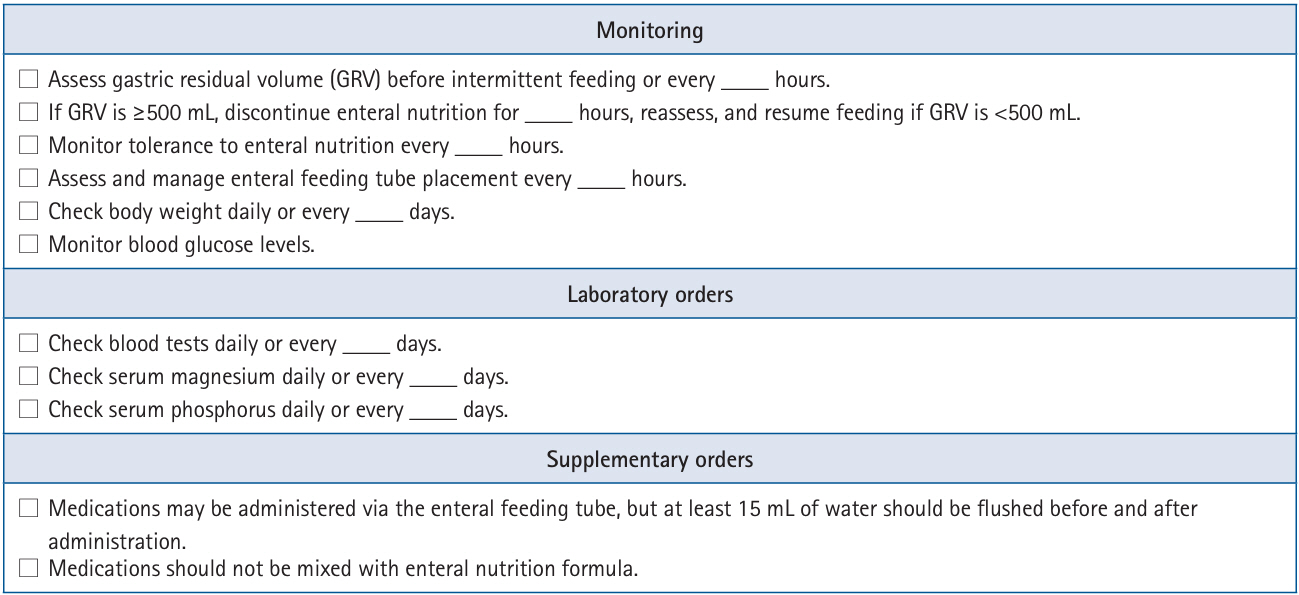 |
Purpose: This study aimed to develop a comprehensive practical guide for enteral nutrition (EN) designed to enhance patient safety and reduce complications in Korea. Under the leadership of the Korean Society for Parenteral and Enteral Nutrition (KSPEN), the initiative sought to standardize EN procedures, improve decision-making, and promote effective multidisciplinary communication. Methods: The KSPEN EN committee identified key questions related to... |
|
|
|
| |
| Reviews |
| Pathogenesis, risk factors, and management of postoperative delayed gastric emptying after distal gastrectomy: a narrative review |
| Cheong Ah Oh |
| DOI: http://doi.org/10.15747/ACNM.25.0007 |
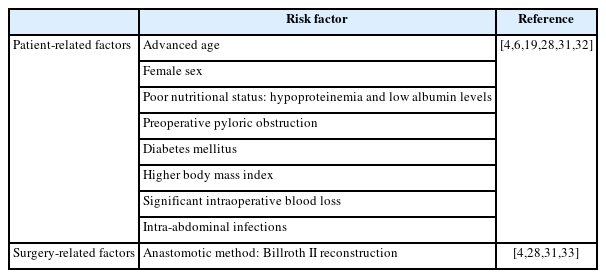 |
Purpose: This narrative review elucidates the complex pathogenesis, key risk factors, and effective management strategies for postoperative delayed gastric emptying (DGE) following distal gastrectomy with D2 lymphadenectomy, a definitive procedure for middle and lower gastric cancer. It also explores opportunities for improved prevention and innovative treatment options. Current concept: DGE significantly disrupts gastric motility and presents with symptoms such as... |
|
|
|
| |
| Perioperative nutritional management to improve long-term outcomes in critically ill perioperative organ transplant patients: a narrative review |
| Toshimi Kaido |
| DOI: http://doi.org/10.15747/ACNM.25.0005 |
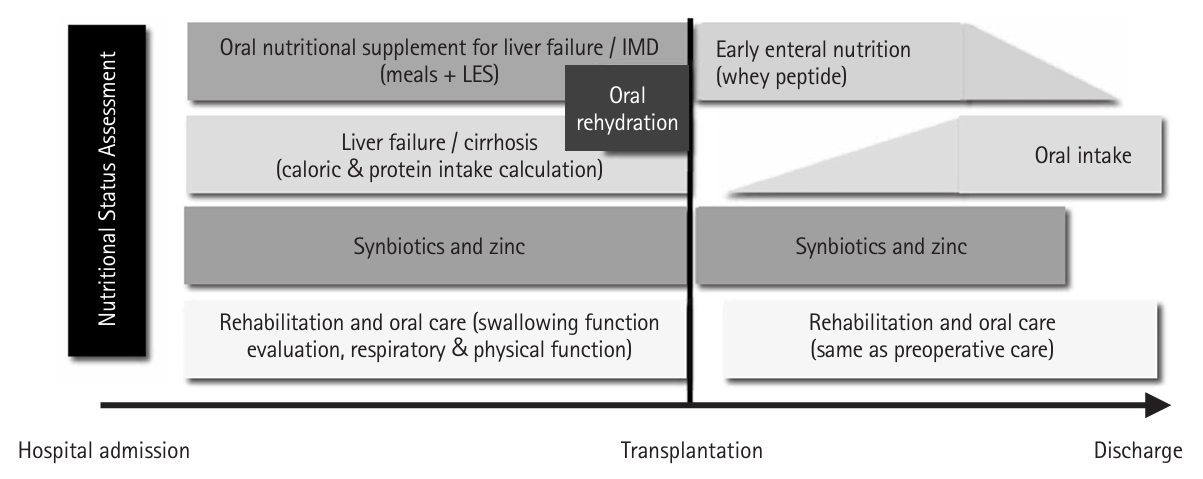 |
Purpose: This review examines the significance of perioperative nutritional management in organ transplantation, with a particular focus on liver transplantation. Organ transplant recipients often experience malnutrition and sarcopenia due to nutritional and metabolic abnormalities associated with organ dysfunction. Because transplantation is a highly invasive procedure, optimizing perioperative nutritional care is critical for improving short-term outcomes and reducing postoperative infection-related mortality. Current... |
|
|
|
| |
| Original Articles |
| Development of a pre- and re-habilitation protocol for gastrointestinal cancer surgery |
| Eun Young Kim, Jung Hoon Bae, Jiseon Kim, Eun Joo Yang, Sang-Jae Park, In Kyu Lee, on behalf of the Task Force Team for Development and Trial Application of Pre/Rehabilitation Protocol in GI Cancer Surgery |
| DOI: http://doi.org/10.15747/ACNM.25.0001 |
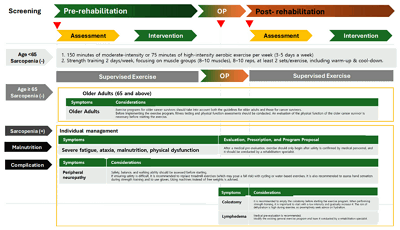 |
Purpose: Surgical resection is the primary curative treatment for gastrointestinal (GI) cancer; however, it is associated with high postoperative complication rates and impaired recovery. Frailty, malnutrition, and sarcopenia increase morbidity and mortality, underscoring the need for perioperative rehabilitation programs. Standardized rehabilitation protocols during the perioperative period are currently lacking in Korea. We aimed to develop an evidence-based rehabilitation protocol for... |
|
|
|
| |
| Comparison of efficacy of enteral versus parenteral nutrition in patients after esophagectomy in Malaysia: a prospective cohort study |
| Ramizah Mohd Shariff, Sze Chee Tee, Shukri Jahit Mohammad, Khei Choong Khong |
| DOI: http://doi.org/10.15747/ACNM.24.016 |
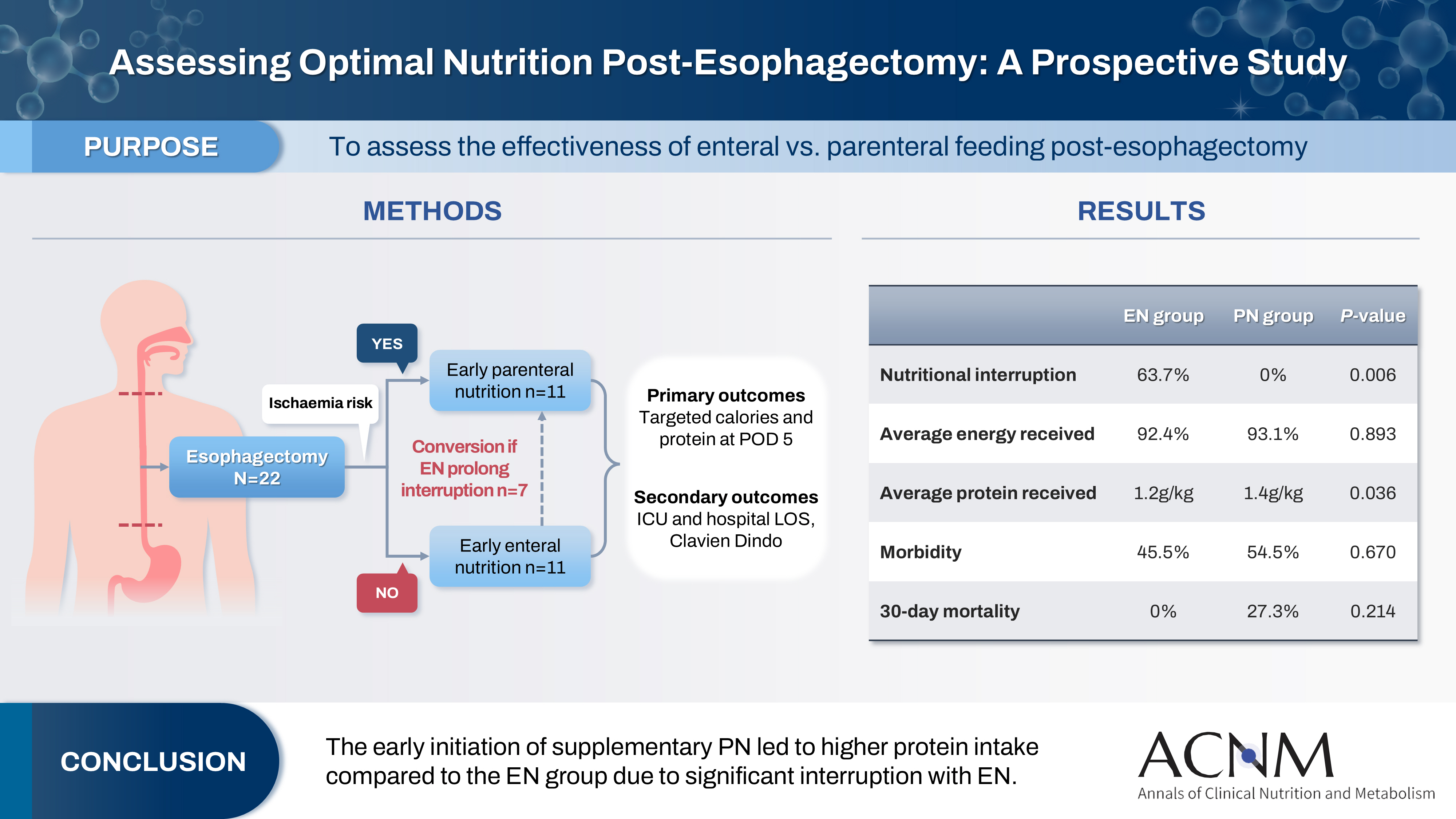 |
Purpose: This study aims to assess the effectiveness of enteral versus parenteral feeding in patients after esophagectomy. Methods: This a prospective cohort study of post-esophagectomy intensive care unit (ICU) patients over 12 months in the National Cancer Institute, Malaysia. Early enteral feeding followed the Enhanced Recovery After Surgery protocol, and parenteral nutrition (PN) was considered if there was a risk for... |
|
|
|
| |
| Impact of postoperative nutritional status on the patients’ clinical outcomes and knee biomechanics following total knee arthroplasty in Japan: a prospective cohort study |
| Kenichi Kono, Tetsuya Tomita, Takaharu Yamazaki, Masashi Tamaki, Shuji Taketomi, Ryota Yamagami, Reo Inoue, Yuki Taniguchi, Sakae Tanaka, Kazuhiko Fukatsu |
| DOI: http://doi.org/10.15747/ACNM.24.019 |
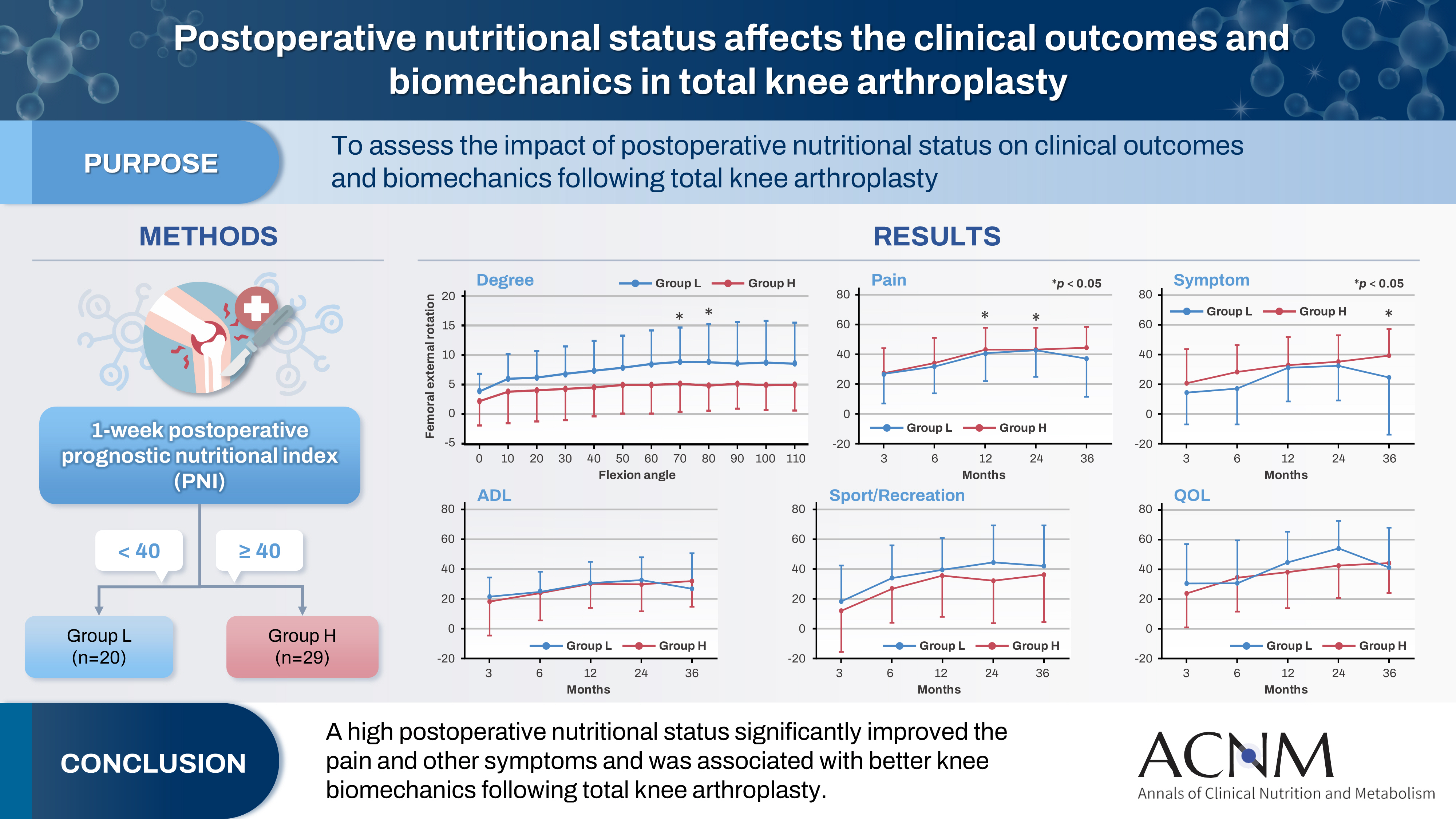 |
Purpose: The impact of postoperative nutritional status on clinical outcomes and biomechanics following total knee arthroplasty remains largely unknown. This study aimed to assess this question using the prognostic nutritional index to evaluate the nutritional status of orthopedic participants. Methods: Patients with knee osteoarthritis who underwent total knee arthroplasty (n=49) in Japan were divided into two groups based on their 1-week... |
|
|
|
| |
| The enteral feeding tube access route in esophageal cancer surgery in Japan: a retrospective cohort study |
| Hiroyuki Kitagawa, Keiichiro Yokota, Tsutomu Namikawa, Kazuhiro Hanazaki |
| DOI: http://doi.org/10.15747/ACNM.25.0003 |
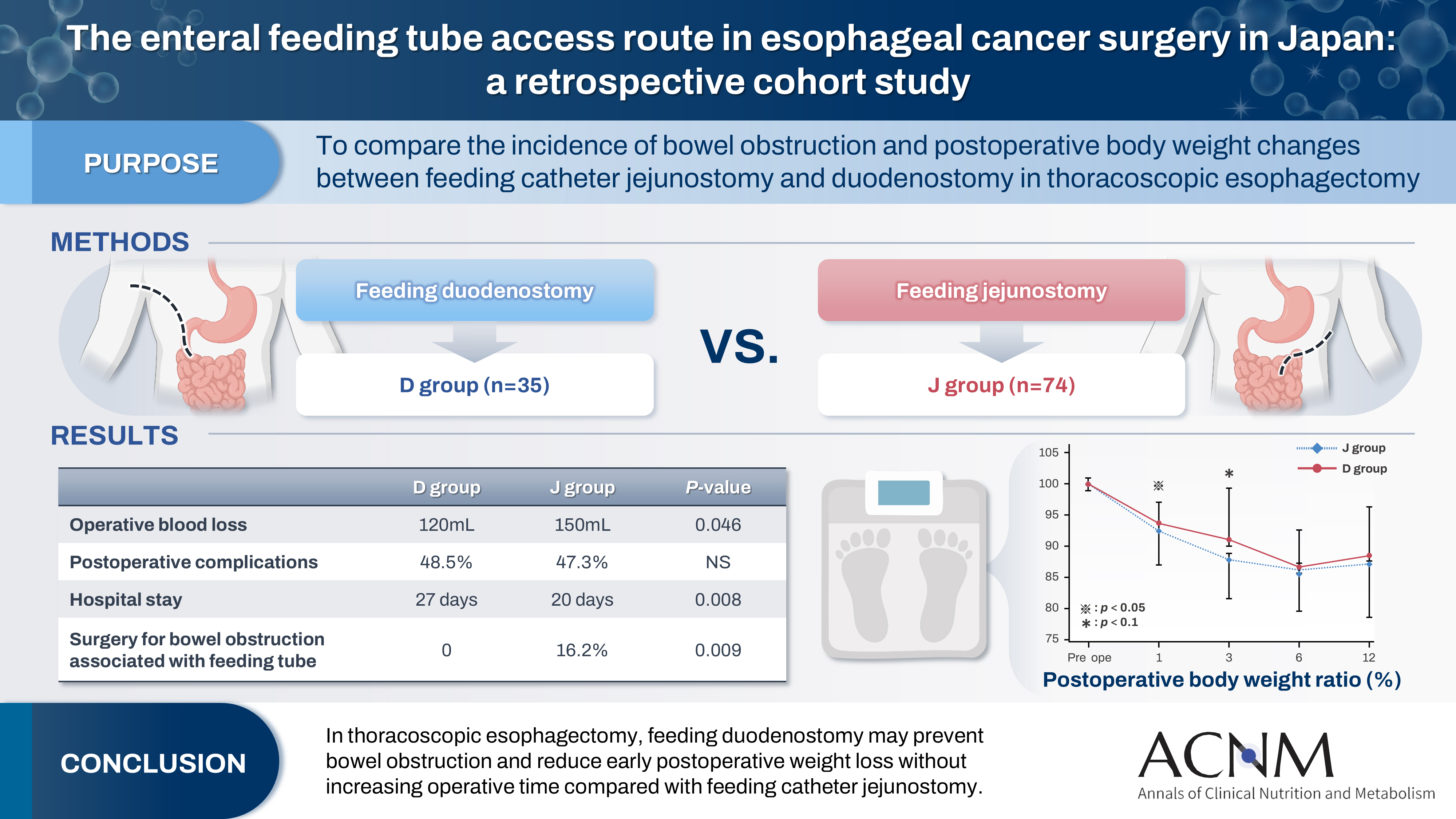 |
Purpose: Feeding catheter jejunostomy is a useful access route for early enteral nutrition during esophageal cancer surgery. However, it may lead to postoperative bowel obstruction associated with feeding jejunostomy (BOFJ). To prevent BOFJ, we introduced feeding catheter duodenostomy via the round ligament in 2018. This study aimed to compare the incidence of BOFJ and postoperative body weight changes between feeding... |
|
|
|
| |
| Perioperative outcomes of older adult patients with pancreatic cancer based on nutritional status: a retrospective cohorat study |
| Takanori Morikawa, Masaharu Ishida, Masamichi Mizuma, Kei Nakagawa, Takashi Kamei, Michiaki Unno |
| DOI: http://doi.org/10.15747/ACNM.25.001 |
 |
Purpose: This study investigated the effects of preoperative nutritional status on postoperative outcomes in older adult patients with pancreatic adenocarcinoma. Methods: The background and perioperative factors of patients who underwent pancreatectomy for pancreatic adenocarcinoma between 2007 and 2020 were retrospectively analyzed. Results: Patients aged 75 years or over (older adults) were significantly associated with hypertension, upfront surgery, and lower prognostic nutritional index.... |
|
|
|
| |
| Association between decreased dietary intake during hospitalization and long-term weight loss in postoperative gastric cancer patients over 75 years of age: a retrospective cohort study |
| Daiki Tabe, Isao Miyajima, Akira Tsukada |
| DOI: http://doi.org/10.15747/ACNM.25.0004 |
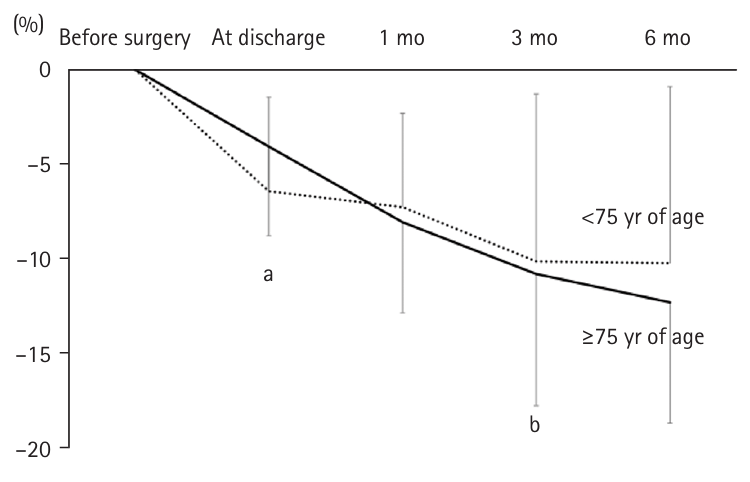 |
Purpose: Weight loss following gastrectomy is a significant concern, and maintaining adequate nutrition is necessary, especially given the growing number of older adult patients. This study examined the relationship between postoperative food intake and long-term weight loss in postgastrectomy patients aged ≥75 years. Methods: Out of 88 patients who underwent gastrectomy for gastric cancer at our institute, 46 were aged ≥75... |
|
|
|
| |
| Effects of enteral nutrition formulas with varying carbohydrate amounts on glycemic control in diabetic mice |
| Yukari Miki, Kazuo Hino |
| DOI: http://doi.org/10.15747/ACNM.25.0006 |
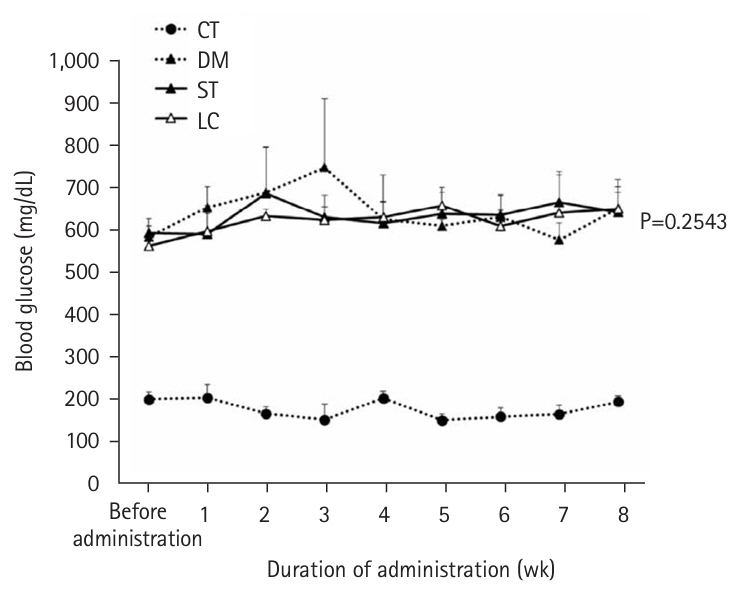 |
Purpose: This study evaluated the effects of an 8-week liquid diets with different carbohydrate contents–64% energy in HINE E-Gel (ST) and 50% energy in HINE E-Gel LC (LC)–on glycemic control and nutritional status in a mouse model of type 2 diabetes mellitus (db/db mice). The objective was to determine whether reducing carbohydrate intake within the Dietary Reference Intakes for Japanese... |
|
|
|
| |

